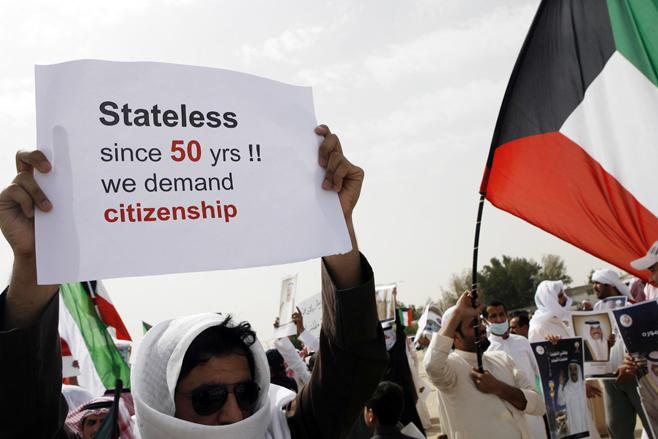Bidoon – meaning ‘without’ in Arabic – is used to categorize a portion of Kuwait’s population who are ‘without’ nationality. Kuwait’s bidoon are largely made up of nomadic Arab tribes that were residing in Kuwait around the time the country gained independence in 1961 and were unable to register for citizenship, either due to lack of understanding or an inability to prove their residence in the area. In the first few decades following Kuwaiti independence, the bidoon population was not severely disadvantaged. However, from the mid-1980’s and onward, sectarian strife, regional tensions, and economic upheaval adversely affected the bidoon population, and in 1986 the government demoted the bidoon population to “illegal residents” and stripped them of their rights. The lack of Kuwaiti citizenship among the bidoon minority in the country leaves the individuals at increased risk of human rights abuses.
In February and March of 2011, hundreds of bidoon men and women protested the government’s failure to act on their citizenship applications, on the far outskirts of Kuwait City. Government forces responded with tear gas and water cannons, and arbitrarily detained dozens of peaceful protesters. Those involved in these protests, and activists for bidoon rights, recieved red flags attached to their files within governmental systems; once flagged, their access to basic amenities and employment is severely curtailed or revoked. These flags extend to their families as well, so that entire families can be denied the right to work.
Not holding Kuwaiti nationality severely impedes the bidoon community’s access to education, medical assistance and employment. In many ways statelessness has contingently adverse effects on the population. Many bidoon families are unable to obtain marriage certificates or birth certificates for their children, which in turn restricts the children’s ability to obtain government-issued identification, medical care, and to attend school. Access to proper medical assistance when giving birth is limited for women without a marriage certificate, and without a certificate the birth of a baby in Kuwait is considered illegal; bidoon mothers cannot give birth in a public hospital. Reports of bidoon women being subjected to sexual harassment from Kuwaiti authorities while applying for birth and marriage certificates have also surfaced.
The vicious cycle of inaccessibility of resources for the bidoon community is evident even in education. Without a birth certificate bidoon children cannot be admitted to government schools, and must pursue private education, which is often substandard, and prohibitively costly for families. As a result, girls risk being kept out of school because when families cannot afford to educate all children they typically choose to educate sons over daughters.
Most bidoon families cannot in fact afford private education as a product of their limited employment options. Under Kuwaiti law, only those with citizen or legal resident status can legally hold employment. While the government has provided limited exceptions, Human Rights Watch notes that bidoon status creates significant hurdles to finding employment. Access to public services remains discretionary for bidoon individuals and is not available on an equal basis, for example, bidoon activists have repeatedly told Amnesty International that members of the community cannot register property, such as a car or business, under their name. Many allege that the only way to do so is to bribe officials.
Article 12 of the International Covenant on Civil and Political Rights (ICCPR) recognizes the right of an individual “to leave any country, including his own,” and protects against arbitrary deprivation of the right to enter one’s own country. Yet, Kuwait rarely issues travel documents, and does so only in the form of “temporary passports” to bidoon who hold security cards, exclusively for the travel purposes of education, medical treatment, or pilgrimage. One bidoon woman, Zahir, expressed the frustration of statelessness—“We are like prisoners. We cannot go outside Kuwait; we cannot live inside Kuwait.”
Because they are considered illegal, bidoon cannot participate in political processes or advocate for their right to citizenship, as bidoon are not permitted judicial recourse to argue their cases for citizenship. Kuwait is home to between 93,000 and 106,000 bidoon and the deprivation of citizenship and treatment of this demographic does not meet international human rights standards. Thus, Kuwait is in breach of international human rights law, namely, the Universal Declaration of Human Rights (UDHR) and Article 29 of the Arab Charter on Human Rights (ACHR) as well as a number of treaties to which Kuwait has acceded, including the ICCPR and International Covenant on Economic, Social, and Cultural Rights (ICESCR). Given the gravity of human rights issues and consequences the bidoon population face for their status, the international community must put additional pressure on Kuwait to rectify the problems created by their perpetual refusal to grant a substantial number of bidoon citizenship.
Serena Dineshkumar is an Advocacy Intern with ADHRB.





